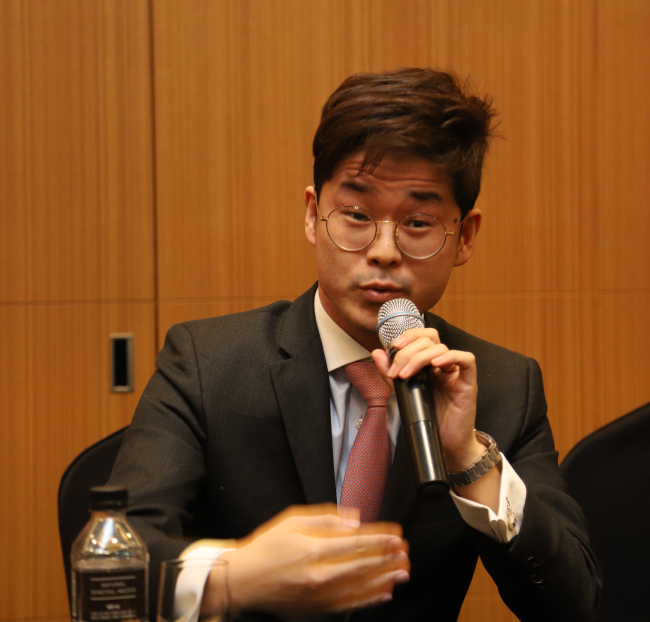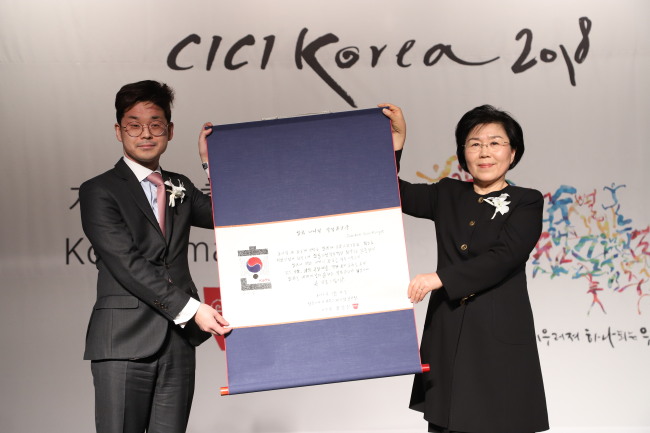Joachim Son-Forget, a French National Assemblyman who represents French citizens overseas, is an industrious middleman bridging France and the world through innovative enterprises.
Found abandoned on the streets of Korea in 1983, Son-Forget was adopted to a French family at 3 months old. There, he grew up to become a radiologist and cognitive scientist, trained pianist and avid karate practitioner, before joining the party of French President Emmanuel Macron.
The 34-year-old wunderkind represents the sixth constituency for French citizens overseas in Switzerland and Liechtenstein. He is also the president of the France-Korea Friendship Group, a parliamentary organization entrusted with smoothing bilateral political exchanges.
For his efforts to strengthen ties between France and Korea, Son-Forget was awarded the 14th Korea Image Award by the Corea Image Communications Institute on Jan. 16. In an exclusive interview with The Korea Herald he expressed feeling honored by the award and vowed to “introduce more of Korea to France and more of France to Korea.”
 |
Joachim Son-Forget, a French National Assemblyman, represents French citizens overseas. (Corea Image Communications Institute) |
“The first similarity between the administrations of President Macron and Korean President Moon Jae-in is that they won the elections by riding on the widespread sentiments of Korean and French peoples, who have long ardently desired change in their countries’ politics,” the politician said. “In terms of policies, both governments are advocates of progressive pragmatism. The key area of cooperation lies in combatting climate change and promoting sustainable development. Korea is a major partner of France in implementing the Paris climate agreement.”
The Frenchman said he was heavily involved in international relations -- including North Korea and Korean peninsula security, economic relations with South Korea and Nigeria, protection of seas and oceans and defense and strategy -- as a member of the commission on foreign affairs. Also as president of the friendship association, he is charged with promoting parliamentary diplomacy and intergovernmental affairs, encompassing innovation, economic partnership, cultural and academic exchanges as well as strategy and defense.
“The France-Korea relations are on the soundest footing,” Son-Forget claimed, mentioning a channel for bilateral strategic dialogue and vibrant parliamentary exchanges through the friendship association with more than 50 members, who have expressed grave concerns about the security dynamic on the Korean Peninsula.
“We believe that strengthening our bilateral relations is important not only for our two countries, but also in terms of improving multilateralism.”
Son-Forget expounded that France and Korea should understand their relations in the context of irreversible and irrepressible global cooperation, citing the North Korean nuclear conundrum, which threatens not only South Korea’s sovereignty, but also the world’s security.
 |
For his efforts to strengthen ties between France and Korea, Son-Forget, beside Corea Image Communications Institute President Choi Jung-wha, was awarded the 14th Korea Image Award by CICI on Jan. 16. (CICI) |
Turning to economic issues, the parliamentarian stressed that he now devotes his energy to new strategies to use the global governance architecture and spur national development. As co-president of the Global Variations Institute, an innovation-driven think tank with a global outreach, he oversees research in the Internet of Things, blockchain, aerospace engineering and behavioral economics, among other sectors.
“These initiatives have to be based on global governance and should ultimately improve its operation for a better future,” he underlined.
Son-Forget touched on Macron’s ambitious reform initiatives -- the central plank of the young president’s vision of a new France -- saying the government lowered the corporate tax from 33 percent to 25 percent to lure foreign investments. Macron’s En Marche! (In Motion!) party won a sweeping victory in last year’s June elections and has used that energy to overhaul France’s rigid labor laws.
“France has been unable to carry out labor reforms over the last 10 years due to fierce resistance from labor groups. But the current government has managed to garner enough support to enact and implement these critical and necessary reforms,” he said.
“It’s a win-win. The point is to facilitate hiring and firing of employees, but not in a way that hurts either the employees or employers. By providing vocational training and support to the unemployed during their transition to new and better jobs, we give them freedom, while increasing social and professional mobility. We also give tax incentives to employers.”
The reform act passed the French National Assembly late last year and will apply to businesses over the coming months, he added.
By Joel Lee (
joel@heraldcorp.com)









